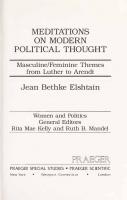Judgment, Imagination, and Politics: Themes from Kant and Arendt 9780847699704, 0847699706, 9780847699711, 0847699714
Judgment, Imagination, and Politics brings together for the first time leading essays on the nature of judgment. Drawing
217 69 13MB
English Pages 352 [345] Year 2001
Recommend Papers

- Author / Uploaded
- Ronald Beiner (editor)
- Jennifer Nedelsky (editor)
File loading please wait...
Citation preview
Judgment, Imagination, and Politics
Judgment, Imagination, and Politics Themes from Kant and Arendt
Edited by Ronald Beiner and Jennifer Nedelsky
ROW MAN & LITTLEFIELD PUBLISHERS, INC. Lanham • Boulder • New York • Oxford
ROWMAN & LITTLEFIELD PUBLISHERS, INC. Published in the United States of America by Rowman & Littlefield Publishers, Inc. 4720 Boston Way, Lanham, Maryland 20706 www.rowmanlittlefield.com 12 Hid’s Copse Road Cumnor Hill, Oxford 0X2 9JJ, England Copyright © 2001 by Rowman & Littlefield Publishers, Inc.
All rights reserved. No part of this publication may be reproduced, stored in a retrieval system, or transmitted in any form or by any means, electronic, mechani cal, photocopying, recording, or otherwise, without the prior permission of the publisher. British Library Cataloguing in Publication Information Available
Library o f Congress Cataloglng-in-Publication Data Judgment, imagination, and politics : themes from Kant and Arendt / edited by Ronald Beiner and Jennifer Nedelsky. p. cm. Includes bibliographical references and index. ISBN 08476-9970-6 (alk. paper)—ISBN 0-8476-9971-4 (pbk.: alk. paper) 1. Political science—Philosophy. 2. Judgment—Political aspects. 3. Arendt, Hannah—Contributions in political science. 4. Arendt, Hannah—Views on judgments. I. Beiner, Ronald, 1953- II. Nedelsky, Jennifer. JA71 J836 2001 172’.1—dc21
2001019090
Printed in the United States of America The paper used in this publication meets the minimum requirements o f Ameri can National Standard for Information Sciences—Permanence of Paper for Printed Library Materials, ANSI/NISO Z39.48-1992.
Contents
Introduction
vii
Part 1 The Problem o f Judgment in Recent Moral and Political Philosophy 1. The Crisis in Culture: Its Social and Its Political Significance
Hannah Arendt
3
2. Aesthetic Problems o f Modem Philosophy
Stanley Cavell
27
3. Moral Judgment
Charles Larmore
47
4. The Public Use o f Reason
Onora O’Neill
65
Part 2 Autour de Hannah Arendt: Debates in Contemporary Political Theory Concerning the Arendtian Theme o f Judging 5. Rereading Hannah Arendt’s Kant Lectures
Ronald Beiner
91
6. Judgment, Diversity, and Relational Autonomy
Jennifer Nedelsky
103
7. The Judgment o f Arendt
George Kateb
121
Contents
vi
8. Judging Human Action: Arendt’s Appropriation o f Kant
RobertJ. Dostal
139
9. Hannah Arendt on Judgment: The Unwritten Doctrine o f Reason
Albrecht Wellmer
165
10. Judgment and the Moral Foundations o f Politi£S'tfriianqah Arendt’s Thought
Seyla'Benhabib
)
183
11. Asymmetrical Reciprocity: On Moral Respect, Wonder, and Enlarged Thought
Iris Marion Young
205
12. Embodied Diversity and the Challenges to Law
Jennifer Nedelsky
229
13. When Actor and Spectator Meet in the Courtroom: Reflections on Hannah Arendt’s Concept o f Judgment
Leora Y Bilsky
257
Hannah Arendt: Modernity, Alienation, and Critique
Dana R. Villa
287
Index
311
About the Contributors
317
Introduction
As w e enter the twenty-first century, there is a pressing need for an adequate theory o f judgment.1 It is essential to understanding politics, from the demands and benefits o f democratic citizenship, to the meaning o f national community and the debates over international human rights. In addition, judgment can now be seen as essential to the realms o f law and science, whose claims to objectivity have been held out as grounds for expertise that can supersede the “merely” political. Indeed, subjectivity—and its complex relation to intersubjectivity—is now widely recognized as a dimension o f all human endeavor. The danger is that the recognition o f subjectivity w ill be misinterpreted as a collapse into the realm o f the arbitrary, where only force or “preference maximization” can hold sway. Hannah Arendt offers us an out line o f a theory o f judgment that shows how judgment, with its irreducibly subjective dimension, can nevertheless claim validity, or how subjectivity gets “transmuted” into fotersubjectivity. Her approach provides a path to understanding the role o f judgment in politics, in law, in science, and in daily life, at the same time that it invites a rethinking o f the terms objectivity, sub jectivity, truth, persuasion, and validity.2 Let us begin with Arendt’s own preoccupation: politics. The idea o f democ racy presupposes an account o f political judgment, for without an under standing o f how human beings are capable of making reasoned judgments about a shared public world, it would remain mysterious how one could con ceive the very notion o f a democratic citizen. Hannah Arendt, who was inspired by her reading o f Immanuel Kant’s Critique o f Judgment, tried to make hisjaccount ofaesthetic judgment the basis oFa^oIitical philosophy.7 What Arendt hoped to drawtheoretically from her politically charged read
viii
Introduction
ing o f Kant’s third Critique is well summarized in the following passage from an early version o f Arendt’s Kant lectures: The Critique o f Judgment is the only [one o f Kant’s] great writings where his point of departure is the World and the senses and capabilities which made men (in the plural) fit to be inhabitants of it. This is perhaps not yet political philosophy, but it certainly is its sine qua non. If it could be found that in the capacities and regulative traffic and intercourse between men who are bound to each other by the common possession of a world (the earth) there exists an a priori principle, then it would be proved that man is essentially a political being.4
Here Arendt more or less announces the program for a political philosophy o f judgment drawn from Kant. However, the attempt to reflect philosophically on what makes human beings capable o f sizing up the “ultimate particulars” that compose moral and political life and that present themselves for judgment goes all the way back to Aristotle’s analysis o f phronesis, practical wisdom, in Book 6 o f the Nicomachean Ethics; and among contemporary theorists, a whole generation of neo-Aristotelian philosophers have highlighted once again the importance o f concretely situated practical judgment as central to the understanding o f eth ical and political life.5 The Aristotelian theme o f practical wisdom is nicely encapsulated by Alasdair MacIntyre when he defines moral virtue in terms of a capacity for practical reasoning that “is not manifested so much in the knowledge o f a set o f generalizations or maxims which may provide our prac tical inferences with major premises; its presence or absence rather appears in the kind o f capacity for judgment which the agent possesses in knowing how to select among the relevant stack o f maxims and how to apply them in particular situations. ”6 In an important sense, reflection on the theme o f judgment teaches us the limits o f theory, for judgment(whether in ethical or polit ical life) attends to particulars that are beyond the purview of theory as such. As HansJonas makes the point: “there is no science o f judgment... judgment as concerned with particulars is necessarily outside science and strictly the bridge between the abstractions o f the understanding and the concreteness o f life.” He goes on (again in reference to Aristotle): “knowledge o f use. . . is acquired or learned in ways different from those o f theory. This is the reason why Aristotle denied there being a science o f politics and practical ethics; the where, when, to whom . . . cannot be reduced to general principles. Thus there is tl^eorpaajluse o f theory, but no theory o f the use o f theory.”7 Or as Hans-Geor^Gadamep more succinctly puts it: “There are no rules governing the reasonable use o f rules.”8 An account o f political judgment that attempted to vindicate the capacities for judging and deliberating on the part o f democratic citizens would be founded on the following three claims:
Introduction
ix
1) W e are constantly making political judgments. In saying “w e,” what is meant is not any particular group o f specialists, or specially qualified persons, but ordinary people, that is, common citizens. 2) In making these judgments, w e relate to (and at the same time consti tute) an intersubjectively shared public world. 3) The active exercise of a faculty o f political judgment is good for us as human beings. The corollary o f this is that the shrinking o f opportuni ties for active judgment, or the increasingly passive adherence to norms and beliefs within society, indicates a dislocation, or even pathology, within contemporary political life. This places the account o f political judgment within the wider context o f a theory o f the human good. It also characterizes reflection on political judgment as a point o f depar ture for a more general political philosophy o f citizenship. The exercise o f active judgment is good for us because citizenship in general is good for us. Citizenship is an important aspect o f the human good, and, it fol lows, so is “civic judgment,” or the judging o f public affairs “as a citizen.” If it can be shown (as w e believe a full account o f political judgment would seek to show) that the quality o f our experience atrophies in proportion as w e passively yield to the judgments o f others and cede greater and greater dimensions o f political responsibility (a process that is everywhere at work in modem liberal society), then w e would have powerful reasons to believe that active citizenship is a major component o f the human good. In actively rendering judgments upon our shared world, w e at the same time resolve to comport ourselves as citizens (rather than as clients o f the state, or as priva tized consumers), and thereby affirm our own nature as political beings. As crucial as a theory o f judgment is for politics, judgment is equally impor tant for the realms once contrasted with what some regard as the mere sub jectivity o f politics. Institutions central to Western culture, such as law and science, have long rested upon claims o f objectivity that are now subject to serious dispute. In the physical sciences, it is now widely recognized that the “objective” pursuits o f science often take place within paradigms that are not themselves the result o f objectively determined selection. The necessary choices among theories involve such elusive (and competing) values as ele gance and messiness.9Methodologies involve choices between stances o f dis tance and detachment as opposed to loving engagement.10And commitments bom o f a researcher’s life work based on a particular paradigm routinely, per haps unavoidably, hinder the recognition o f alternatives.11 In short, science requires not just reproducible results, but judgment. In law, scholars point to the way unexamined, largely unconscious metaphoric frameworks shape the ways judges see and choose among alter natives.12 Others argue that the ruling model o f impartiality requires the sup pression o f attention to difference—with negative consequences for women
X
Introduction
and other subordinated groups.13Still others show how the unstated norm in law is a male norm.14 And, in a slightly different vein, many argue that the inevitable interpretive choices in law involve an important subjective element. The purpose o f these diverse arguments has often been to call into question traditional claims o f neutrality and objectivity. In addition, these arguments have been useful not simply for revealing hidden biases, but for highlighting the centrality o f choices that must inevitably have a subjective dimension. The recognition o f subjectivity inherent in human judgment is not, o f course, limited to law and science. For example, many o f the contemporary debates about the nature o f moral decision making or o f the values people hold15 are, in essence, debates about how it is possible to make reasoned, defensible judgments on matters about which there is no universal, clearly demonstrable, or objective truth.16 The task now is to reconstruct the norms o f optimal decision making in all fields—in other words, to articulate the nature and norms o f judgment. Over and over, the central issue is to show that once w e acknowledge the role o f subjectivity, it does not follow that w e are in the realm o f the arbitrary, o f interests that can only be negotiated or advanced through the force o f power. A great deal o f contemporary political and economic rhetoric assumes that anything subjective is an “interest” or preference that can be counted, maxi mized, or bargained about, but is not something to be treated as a judgment, subject to evaluation or persuasion. This rhetorical stance is powerful and pervasive and infects all areas where subjectivity is seen to play a role. Hannah Arendt’s work on judgment offers a promising starting point from which to generate a theory o f judgment that can meet these needs. It is only a starting point because she did not live to write the volume on judgment that would have completed her projected trilogy for The Life o f the Mind.17 Arendt believed that Kant’s work on aesthetic judgment18 provided the key insights into a distinct human faculty: judgment. She wanted to show that it was this faculty that was crucial in politics. While^Arendt’s appropriation o f Kant is contested, there is a set o f core ideas that Arendt and Kant clearly shared. For both, the key idea o f judgment isTfiaTTTis'nefther about cognitive truth claims nor about mere subjective preference. According to Kant, the claim “this painting is beautiful” cannot be proven as an objective truth; but in contrast to “I like this painting,” it is not merely a statement o f preference. The claim o f beauty is a genuine judg ment because it makes a claim o f agreement from others who judge. I cannot compel agreement, as I could with certain kinds o f truth claims.19 But I can persuade and claim that if other judges are truly judging—are not being biased by private inclinations—they will agree. I thus claim that my judgment ____ _ is valid for the community o f judging others. The core o f what makes such judgment possible is oufr “common sense/' shared by other judging subjects. It is this shared sense that allows us to exer-
Introduction
xi
cise an “enlarged mentality” by imagining judgments from the standpoints o f others. When w e judge, we imagine trying to “w oo the consent” o f others to our judgment.20 In this process o f considering the standpoints o f others, w e can free ourselves from our private idiosyncrasies. It is because w e share a common sense that itls possible to communicate about such seemingly pri vate and subjective experiences as beauty and, thus, also to imagine the per spectives o f others. When we use this capacity for an enlarged mentality to free ourselves from idiosyncrasies and inclinations, w e are then capable o f true judgment, for which we claim validity. This brief desgxiption holds4^thfoH€ant^nd for Arendt’s use o f Kant. But there is an important differencelMFor Kant J the ground for the “common sense” is the identical cognitive faCUltfe's'of imagination and understanding that all human beings share. The common sense is, thus, universal, and Kant can say that in exercising the enlarged mentality, w e put ourselves in the place o f every other person. Judgments are, thus, universally valid. The valid ity is a claim upon the agreement o f all others, despite the fact that that agreement, unlike truths o f logic, cannot be compelled by reason (hence the unptersaiityis “merely subjective”).21 (T or Arend) the validity is more limited:








